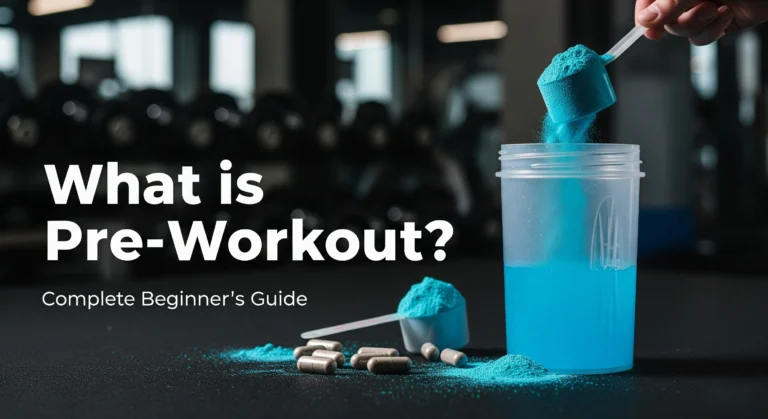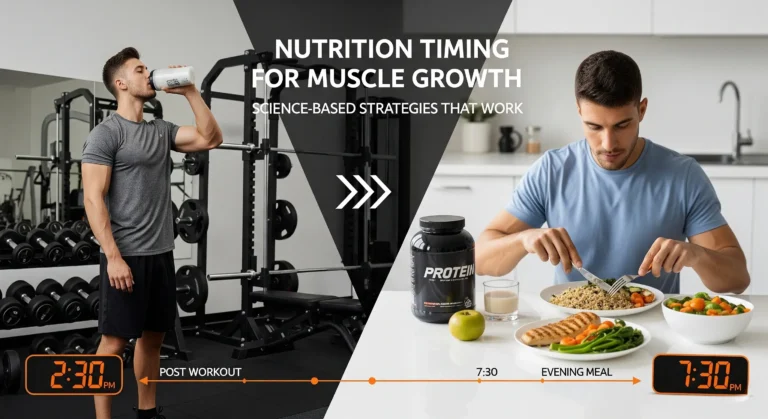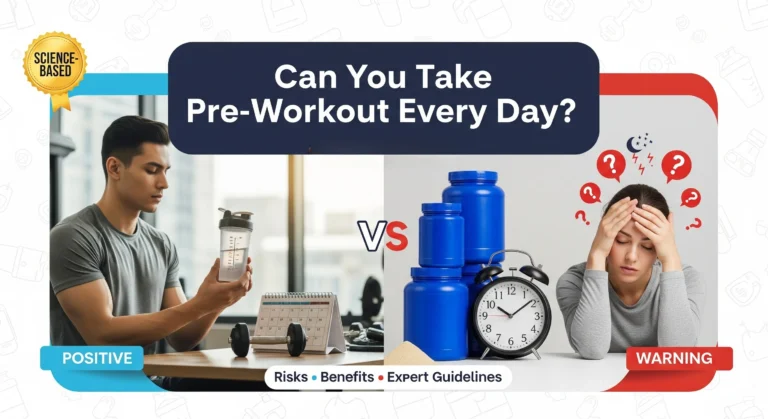
Ever wondered why you’re still wired at 10 PM after taking pre-workout at 5? You’re not alone! The question “how long does pre-workout last” is one of the most common concerns I hear from gym-goers, and for good reason. Studies show that caffeine, the main ingredient in most pre-workouts, has a half-life of 3-7 hours, meaning it can affect your system much longer than you think.
I learned this the hard way when I first started taking pre-workout supplements three years ago. I’d down a scoop around 6 PM for my after-work gym session, crush my workout, then spend the entire night tossing and turning like a caffeinated hamster on a wheel. It took me weeks to figure out that my beloved pre-workout was the culprit behind my insomnia!
The truth is, most people underestimate how long does pre-workout last in their system. What feels like a quick energy boost can actually impact your body for the better part of a day. Understanding how long pre-workout last isn’t just about workout timing—it’s about optimizing your performance while protecting your sleep and overall health. Let me walk you through everything I’ve learned about pre-workout duration, so you don’t make the same mistakes I did.
How Long Pre-Workout Actually Stays in Your System
Here’s the real deal: most pre-workout supplements will stay active in your system for 4-6 hours, but some effects can linger up to 8-10 hours depending on the formula and your individual metabolism. I know, I know—that’s way longer than the 1-2 hours you probably expected, right?
The peak effectiveness usually hits around 30-90 minutes after consumption. This is when you’ll feel most energized, focused, and ready to demolish your workout. But here’s where it gets tricky—just because you don’t feel that intense rush anymore doesn’t mean the ingredients are gone.
Think of it like this: your pre-workout is like a house party. The music might stop pumping at midnight, but there are still people hanging around until 3 AM cleaning up the mess. That caffeine and other stimulants? They’re the stragglers who just won’t leave your system.
I remember testing this theory by taking my usual pre-workout at different times and tracking how I felt throughout the day. When I took it at 2 PM, I could still feel my heart beating faster at dinner time. My sleep tracker even showed elevated heart rate well into the evening, which explained why I felt restless even when I thought the effects had worn off.
The half-life concept is crucial here. If your pre-workout contains 200mg of caffeine, after 5 hours you’ll still have about 100mg floating around in your bloodstream. That’s equivalent to a strong cup of coffee! No wonder so many people struggle with sleep after afternoon workouts.
Key Ingredients and Their Individual Durations
Let’s break down what’s actually in your pre-workout and how long each ingredient decides to crash at your body’s party. Not all ingredients are created equal, and understanding their individual timelines has been a game-changer for my training schedule.
Caffeine is the obvious heavy hitter, with a half-life ranging from 3-7 hours depending on your genetics and tolerance. I’ve found that my caffeine sensitivity increased as I got older—what used to clear my system in 4 hours now takes closer to 6. This stuff doesn’t just disappear when you stop feeling jittery.
Beta-alanine is that ingredient that makes your face tingle like you’re being attacked by tiny electric ants. The tingling sensation usually lasts 60-90 minutes, but the actual performance benefits can stick around for 2-3 hours. I used to think the tingling was a sign of how long it was working, but that’s just the sensory effect—the real muscle endurance boost lasts much longer.
L-citrulline is responsible for those amazing pumps that make you feel like your muscles are about to burst out of your shirt. The blood flow enhancement typically peaks around 1-2 hours and can last up to 6 hours. I’ve noticed that my veins stay more visible well into the evening after taking citrulline-heavy pre-workouts.
Creatine, if included, works differently than the other ingredients. It doesn’t give you an immediate rush, but it builds up in your muscles over time. The acute effects might last 2-4 hours, but the real magic happens with consistent daily use over weeks.
Taurine and B-vitamins are usually out of your system within 3-4 hours, but they can contribute to that overall energized feeling. I’ve found that pre-workouts heavy in B-vitamins sometimes give me bright yellow urine for hours afterward—totally normal but definitely a sign they’re still being processed.
Factors That Affect How Long Pre-Workout Lasts
Your body isn’t a cookie-cutter machine, and neither is your response to pre-workout. I’ve trained with people who can take a scoop at 7 PM and sleep like babies, while others are wired from a half-dose at noon. Here’s what makes the difference.
Body weight plays a huge role that most people ignore. When I was 20 pounds heavier, I needed more pre-workout to feel the same effects, but it also cleared my system faster. Now that I’m leaner, a smaller dose hits harder and lasts longer. It’s basic pharmacology—more body mass means more dilution.
Your caffeine tolerance is probably the biggest factor. If you’re already drinking 3 cups of coffee daily, that 200mg in your pre-workout might feel like a gentle nudge. But if you’re a caffeine lightweight like my friend Sarah, that same dose will have you bouncing off the walls for hours.
Food timing is something I learned through painful trial and error. Taking pre-workout on an empty stomach hits like a freight train and clears faster. With food, the absorption is slower and more sustained. I once took my usual dose after a big lunch and barely felt anything during my workout, but I was still feeling stimulated at bedtime.
Hydration status affects everything. When you’re dehydrated, your kidneys work slower to clear substances from your blood. I’ve noticed that on days when I’m properly hydrated, the effects seem to fade more predictably. Plus, being dehydrated amplifies the jittery side effects.
Age is the factor nobody wants to talk about, but it’s real. As we get older, our metabolism slows down, including how we process stimulants. What used to clear my system in 4 hours now takes 6-7. It’s not fair, but it’s biology.
Signs Your Pre-Workout is Still Active
Learning to recognize when pre-workout is still affecting your system has saved me countless sleepless nights. Your body gives you plenty of clues if you know what to look for—I just wish someone had taught me this earlier.
The most obvious sign is an elevated heart rate. I started tracking mine with a fitness watch and was shocked to see how long it stayed elevated after I thought the pre-workout had worn off. If your resting heart rate is normally 60 BPM and it’s sitting at 75-80 hours after your workout, those stimulants are still partying in your bloodstream.
Jittery hands are another dead giveaway. I remember trying to eat dinner after an evening workout and my fork was shaking like I was nervous about a job interview. That hand tremor is a classic sign that caffeine and other stimulants are still circulating.
Temperature regulation gets weird too. You might find yourself feeling hot and cold at random times, or sweating more than usual even when you’re not active. I’ve had nights where I’d wake up in a cold sweat because my body was still trying to process everything.
Mental effects are subtle but important. If you’re having trouble focusing on anything that requires patience—like reading or watching a movie—your brain might still be overstimulated. Restless leg syndrome is another one I’ve experienced, where you just can’t get comfortable no matter how you position yourself.
Digestive issues can persist too. Pre-workout often speeds up your digestive system, and if you’re still feeling unsettled stomach-wise hours later, that’s a sign it’s still working. I’ve learned to avoid certain foods in the evening after taking pre-workout because my stomach stays sensitive.
Optimal Timing for Pre-Workout Consumption
Getting the timing right has been absolutely crucial for balancing workout performance with normal life. After years of experimentation (and plenty of mistakes), here’s what I’ve learned about when to take your pre-workout.
The sweet spot for taking pre-workout is 15-45 minutes before you plan to start lifting. I’ve found 30 minutes works best for me—enough time for everything to kick in without losing the peak effects during my warm-up. Taking it too early means you’ll peak during your commute to the gym, and too late means you’re just getting started when you should be hitting your hardest sets.
For morning workouts, timing is pretty straightforward. I take mine at 6 AM for a 6:30 workout, and by early afternoon, I’m mostly back to baseline. The only thing to watch out for is that morning caffeine crash around 2-3 PM if you’re sensitive to it.
Evening workouts are where things get tricky. If you’re planning to be in bed by 10 PM, you need to stop taking stimulant-based pre-workouts by 2-3 PM at the latest. I know that sounds ridiculously early, but trust me on this one. I’ve tracked my sleep enough times to know that anything later than 3 PM affects my sleep quality, even if I don’t feel wired.
For afternoon workouts (my personal favorite time), 1-2 PM is usually the latest I’ll take a full dose. Sometimes I’ll do a half-dose at 3 PM if I’m dragging, but that’s pushing it. The key is being honest about your sleep schedule and working backward from there.
Meal timing matters more than most people realize. I prefer taking pre-workout about 2-3 hours after eating a substantial meal. This gives me sustained energy without the crash, and the food helps buffer some of the stomach irritation that can come with stimulants on an empty stomach.
How to Speed Up Pre-Workout Elimination
Sometimes you miscalculate and take your pre-workout too late, or you’re just more sensitive than usual that day. While you can’t instantly flush everything out of your system, there are some strategies that can help speed up the process.
Hydration is your best friend here. Water helps your kidneys filter out waste products more efficiently. I’ve found that drinking 16-20 ounces of water every hour after taking pre-workout helps everything move through my system faster. Don’t go overboard though—you don’t want to dilute your electrolytes.
Light exercise can help metabolize stimulants faster. If I’ve taken pre-workout too late and I’m feeling wired before bed, I’ll do 10-15 minutes of easy walking or light stretching. Nothing intense, just enough to get my blood flowing and help my body process everything.
Eating a small meal with some healthy fats and protein can help stabilize your blood sugar and reduce some of the jittery effects. I’ve had good luck with things like Greek yogurt with nuts or a piece of toast with almond butter. Avoid simple sugars though—they can make the energy crash worse.
Some people swear by L-theanine supplements to counteract caffeine effects. I’ve tried this a few times and it does seem to take the edge off without making me drowsy. Green tea contains natural L-theanine, so that’s another option if you have some handy.
What you shouldn’t do is try to “fight” the stimulants with alcohol or other depressants. This just creates a confusing mix of signals in your body and can actually make sleep quality worse. I learned this lesson the hard way after a few too many “recovery beers” following late pre-workout sessions.
Conclusion
Pre-workout supplements typically remain active in your system for 4-6 hours, with caffeine being the longest-lasting component. The key to maximizing benefits while minimizing side effects lies in understanding your personal tolerance and timing your intake appropriately. Remember, everyone processes these supplements differently—what works for your gym buddy might keep you staring at the ceiling all night!
Start with the recommended dose, track how you feel, and adjust your timing based on your workout schedule and sleep goals. Pay attention to your body’s signals, and don’t be afraid to cut back or switch to a stimulant-free option if regular pre-workout is interfering with your recovery and sleep.
The most important thing I’ve learned is that consistency in your routine matters more than finding the perfect supplement. Whether you’re taking pre-workout at 6 AM or 2 PM, stick to a schedule that works with your life and gives you time to wind down before bed. Your workouts might be intense, but your sleep should be peaceful!



